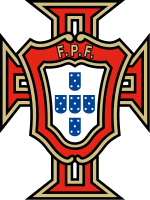Portugal national football team
Men's association football team / From Wikipedia, the free encyclopedia
Dear Wikiwand AI, let's keep it short by simply answering these key questions:
Can you list the top facts and stats about Portugal national football team?
Summarize this article for a 10 years old
The Portugal men's national football team (Portuguese: Seleção Portuguesa de Futebol) has represented Portugal in international men's football competition since 1921. The national team is controlled by the Portuguese Football Federation (FPF), the governing body for football in Portugal. Portugal's home matches are played at various stadiums throughout Portugal, and its primary training ground and technical headquarters, Cidade do Futebol, is located in Oeiras. The head coach of the team is Roberto Martínez[3] and the captain is Cristiano Ronaldo, who also holds the team records for most caps and most goals.
 | |||
| Nickname(s) | A Seleção das Quinas (The Team of the Escutcheons[1]) Lusos (Lusitanians) | ||
|---|---|---|---|
| Association | Portuguese Football Federation (Federação Portuguesa de Futebol, FPF) | ||
| Confederation | UEFA (Europe) | ||
| Head coach | Roberto Martínez | ||
| Captain | Cristiano Ronaldo | ||
| Most caps | Cristiano Ronaldo (201) | ||
| Top scorer | Cristiano Ronaldo (123) | ||
| Home stadium | Various | ||
| FIFA code | POR | ||
| |||
| FIFA ranking | |||
| Current | 8 | ||
| Highest | 3 (May–June 2010, October 2012, April–June 2014, September 2017–April 2018) | ||
| Lowest | 43 (August 1998) | ||
| First international | |||
(Madrid, Spain; 18 December 1921) | |||
| Biggest win | |||
(Almancil, Portugal; 11 September 2023) | |||
| Biggest defeat | |||
(Lisbon, Portugal; 25 May 1947) | |||
| World Cup | |||
| Appearances | 8 (first in 1966) | ||
| Best result | Third place (1966) | ||
| European Championship | |||
| Appearances | 8 (first in 1984) | ||
| Best result | Champions (2016) | ||
| Nations League Finals | |||
| Appearances | 1 (first in 2019) | ||
| Best result | Champions (2019) | ||
| Olympic Games | |||
| Appearances | 1 (first in 1928) | ||
| Best result | Quarter-finals (1928) | ||
| FIFA Confederations Cup | |||
| Appearances | 1 (first in 2017) | ||
| Best result | Third place (2017) | ||
| Website | fpf.pt | ||
Portugal's first participation in a major tournament finals was at the 1966 World Cup, which saw a team featuring Ballon d'Or winner Eusébio finish in third place. Portugal also made it to the semi-finals of the UEFA Euro 1984, losing to hosts and eventual winners France. Under the team's first golden generation in the 1990s, Portugal began consistently featuring in the European Championship and World Cup; they made the semi-finals of the 2006 World Cup, finishing in fourth place, along with placing as runners-up at Euro 2004 as hosts, and reaching the semi-finals of Euro 2000 and Euro 2012. This was in great part due to the production of several players, such as Luís Figo, Rui Costa, Ricardo Carvalho, and Cristiano Ronaldo, who is regarded as one of the greatest players of all time.[4][5]
In 2016, Portugal won its first-ever major trophy, Euro 2016, defeating hosts France in the final. With the win, Portugal qualified and made its only appearance in the FIFA Confederations Cup held in Russia, where they finished in third place. Portugal qualified for and hosted the brand new 2019 Nations League finals where they triumphed, defeating the Netherlands and earning their second major tournament victory in three finals.
Portugal is colloquially referred to as the Seleção das Quinas (a synecdoche based on the flag of the country) and has notable rivalries with Brazil, due to shared cultural traits and heritage,[6] France, due to several important meetings between the two teams at Euro and World Cup, and Spain, known as A Guerra Ibérica in Portuguese or The Iberian War in English, with the rivalry between two countries going back to 1581.[7]